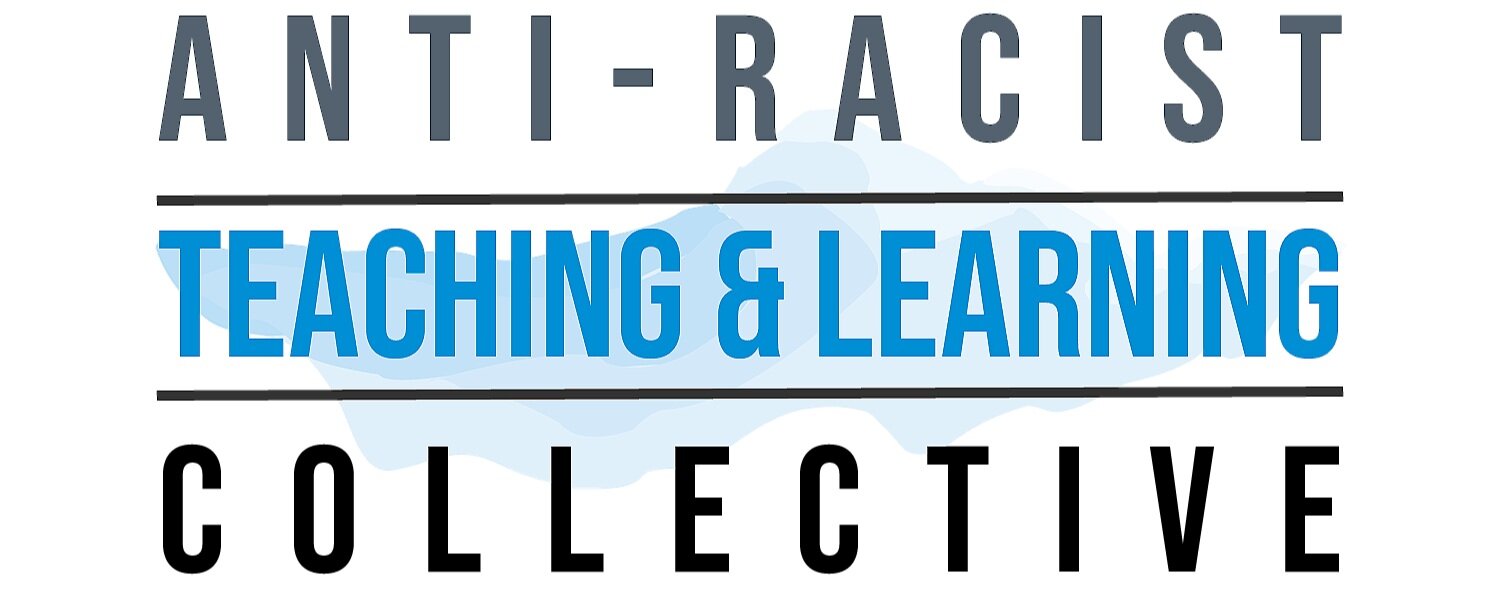Events from our collective & others.
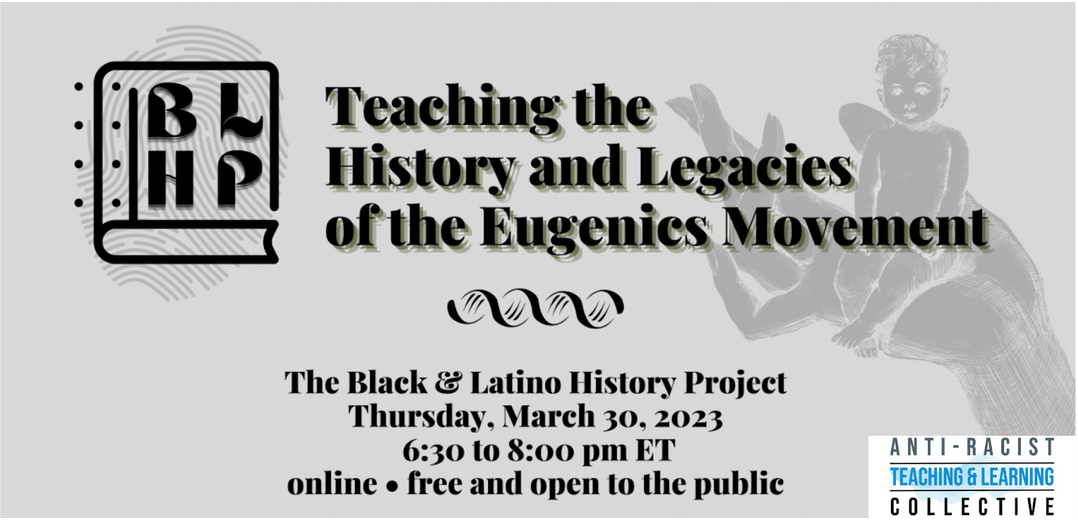
Curriculum Showcase for Teaching about the Eugenics Movement in Connecticut: Racism and Resistance
Join us on Thursday March 30 at 6:30pm via Zoom for a presentation of curricula and lesson plans developed by students and teachers participating in the Teaching about the Eugenics Movement in Connecticut: Racism and Resistance working group.
For two months, a group of K-12 educators and high school students have learned about the history of Eugenics research and advocacy at Yale and in Connecticut through a working group convened by the Black and Latino History Project.
In the 1920s and 1930s, Yale University and Connecticut became international centers of Eugenics research, policy advocacy, and public education. From New Haven, leaders of the American Eugenics Society advocated for the sterilization, incarceration, exclusion and denigration of huge swaths of the public
Their work also faced continued resistance from a wide range of communities, whose legacies we celebrate today in movements for Black Freedom, immigrant power, LGBTQ rights, affirming mental health care, and many others.
The working group has been facilitated by Professor Daniel Martinez HoSang of Yale, Yale undergraduate researcher Dora Guo, Professor Bethsaida Nieves of UConn, and Connecticut historian and social studies educator Eve Galanis.
Register in advance here.
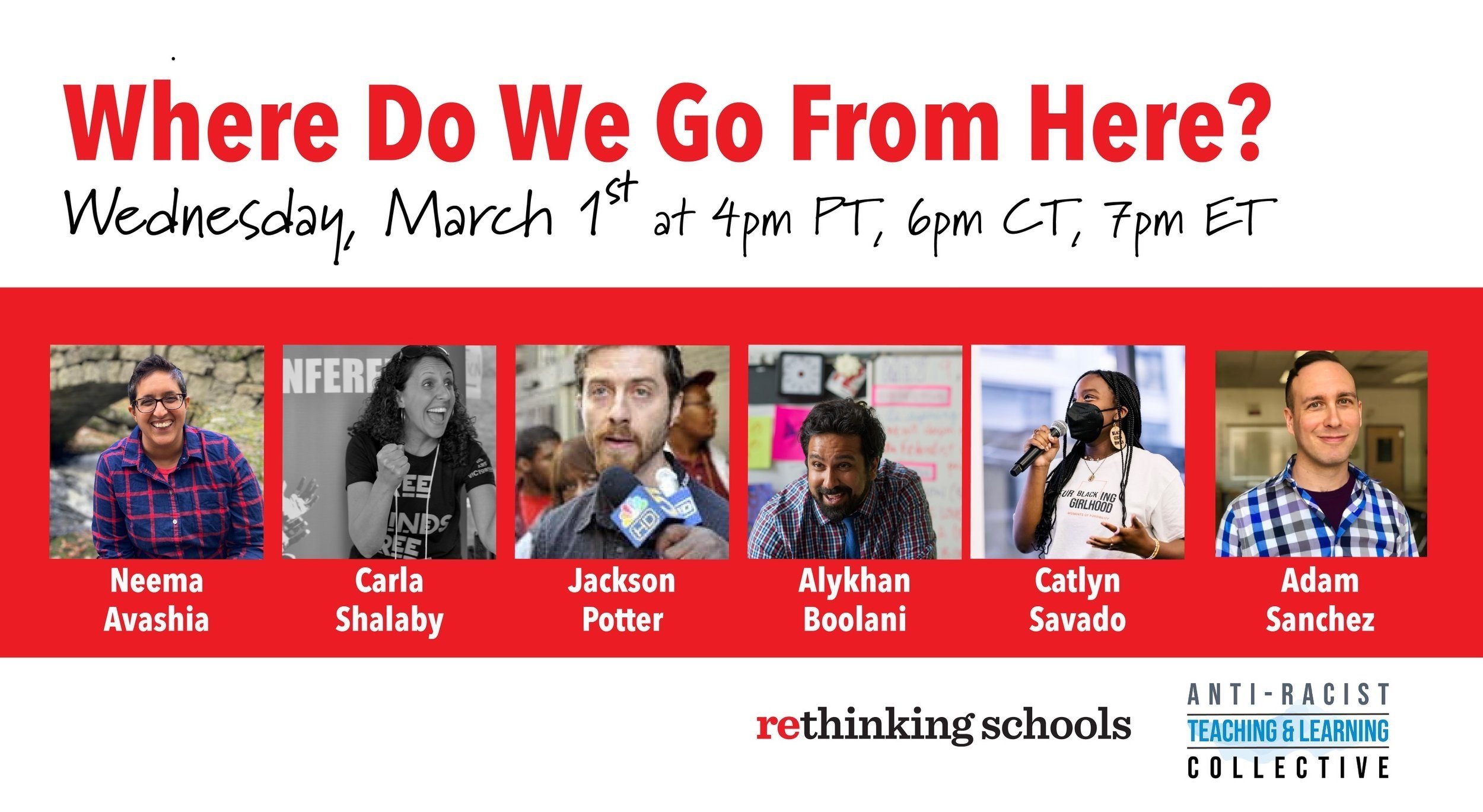
Webinar: Where Do We Go From Here?
How do we build the schools, classrooms, and learning communities that every student needs and deserves? What role do teachers play in creating these conditions and possibilities?
Join the Antiracist Teaching and Learning Collective and Rethinking Schools online on Wednesday, March 1st, at 4pm to consider these questions and more. Continuing the conversation among teachers and students, which began in the February 2022 webinar Beyond “Schools in Crisis,” this discussion brings together educators, students, and community organizers from across the United States to examine the realities we face in our schools. In this webinar, we will ask: Where do we go from here? We’ll explore not only the possibilities that we dream of, but those that already exist in our classrooms, our schools, and our communities.
Panelists:
Neema Avashia is a veteran educator in the Boston Public Schools, currently working as an Ethnic Studies Coach.
Alykhan Boolani is an educator from Berkeley, California. He is the co-principal at Life Academy of Health and Bioscience, a public school in Oakland Unified School District.
Jackson Potter is a Chicago Public Schools graduate, co-founder of the Caucus of Rank and File Educators (CORE), and Vice President of the Chicago Teachers Union.
Adam Sanchez is a social studies teacher at Central High School in Philadelphia, on the editorial board of Rethinking Schools, and the editor of Teaching a People’s History of Abolition and the Civil War.
Catlyn Savado is a student and community organizer on Chicago’s SouthSide.
Carla Shalaby is a fierce believer in the power of young children and their teachers, and works at the intersections of writing, research, teacher support and development, and organizing to cultivate that belief in and out of schools.
The panel is co-moderated by Nataliya Braginsky, Dan HoSang, and Cierra Kaler-Jones.
Nataliya Braginsky is a history educator and organizer with the Anti-Racist Teaching and Learning Collective.
Cierra Kaler-Jones is the Executive Director of Rethinking Schools.
Daniel Martinez HoSang is Professor of Ethnicity, Race & Migration at Yale and a member of the Anti-Racist Teaching and Learning Collective Steering Committee
ASL Interpretation will be available. Register here.
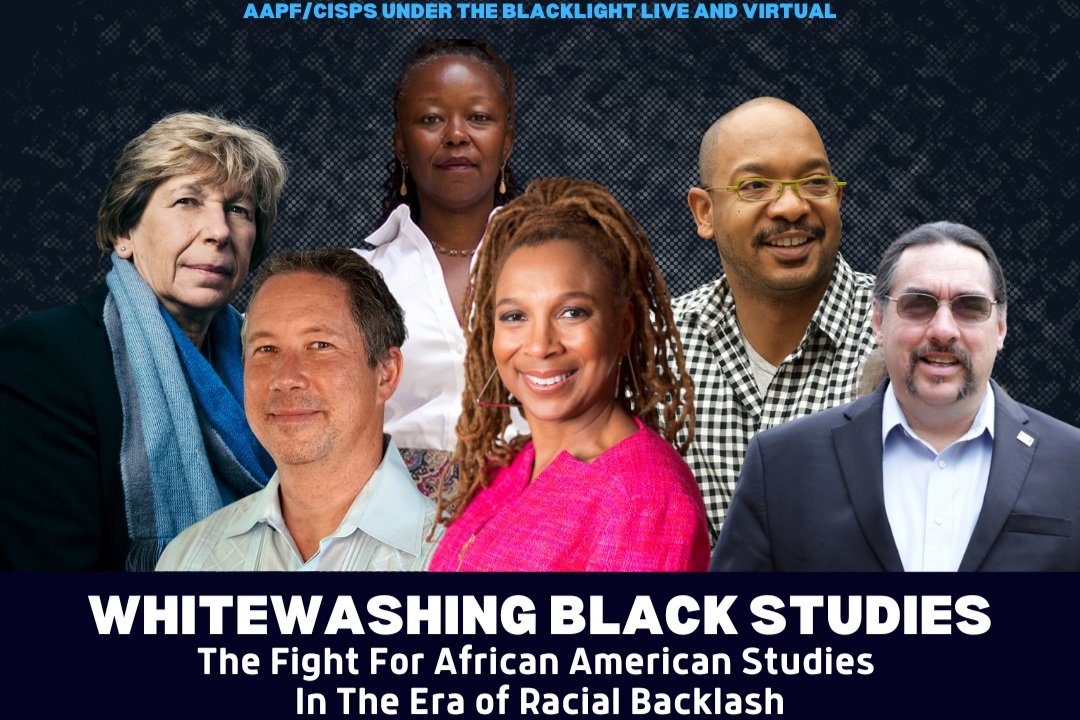
Whitewashing Black Studies: The Fight For African American Studies in the Era of Racial Backlash
The start of this Black History Month has been marked by unprecedented attacks on the introduction of the new AP African American Studies course together with recent revisions which have excised much of the content that had been targeted by Governor Ron DeSantis’s latest assault on the teaching of race and anti-racism.
To make sense of these developments, join AAPF for our next urgent Under the Blacklight conversation—live in New York—where we will bring together stakeholders in public and higher education to discuss the context of this latest educational assault and why we cannot adopt a carve out strategy to defend African American studies.
These bad-faith, anti-democratic attacks not only elevate anti-Blackness onto the political agenda but distort and suppress educational tools designed to build better societal understanding of the intersections of racism, history and current politics. Ideas like Critical Race Theory or intersectionality are not ancillary to the teaching of Black history or American history, they are essential. To live in a country where politicians dictate which books can be on school library shelves or which ideas can be included in curricula—as opposed to empowering professional educators to make these choices—not only underserves our nation's school children, but also undermines democracy.
Featuring:
Kimberlé Crenshaw - Professor of Law, Columbia/UCLA, Executive Director of AAPF
Roderick Ferguson - Professor of Women's, Gender, and Sexuality Studies and American Studies at Yale University
Daniel Martinez HoSang - Professor of Ethnicity Race and Migration and American Studies at Yale University
Paul Ortiz - Professor of History at the University of Florida
Randi Weingarten - President of the American Federation of Teachers
We invite you to join us in charting a call to action to reject the normalization of anti-Blackness with clarity and determination.
This event is co-sponsored by the Institute for Research in African-American Studies / African American and African Diaspora Studies at Columbia University, the Black Law Students Association at Columbia and The Anti-Racist Teaching and Learning Collective (ARTLC).
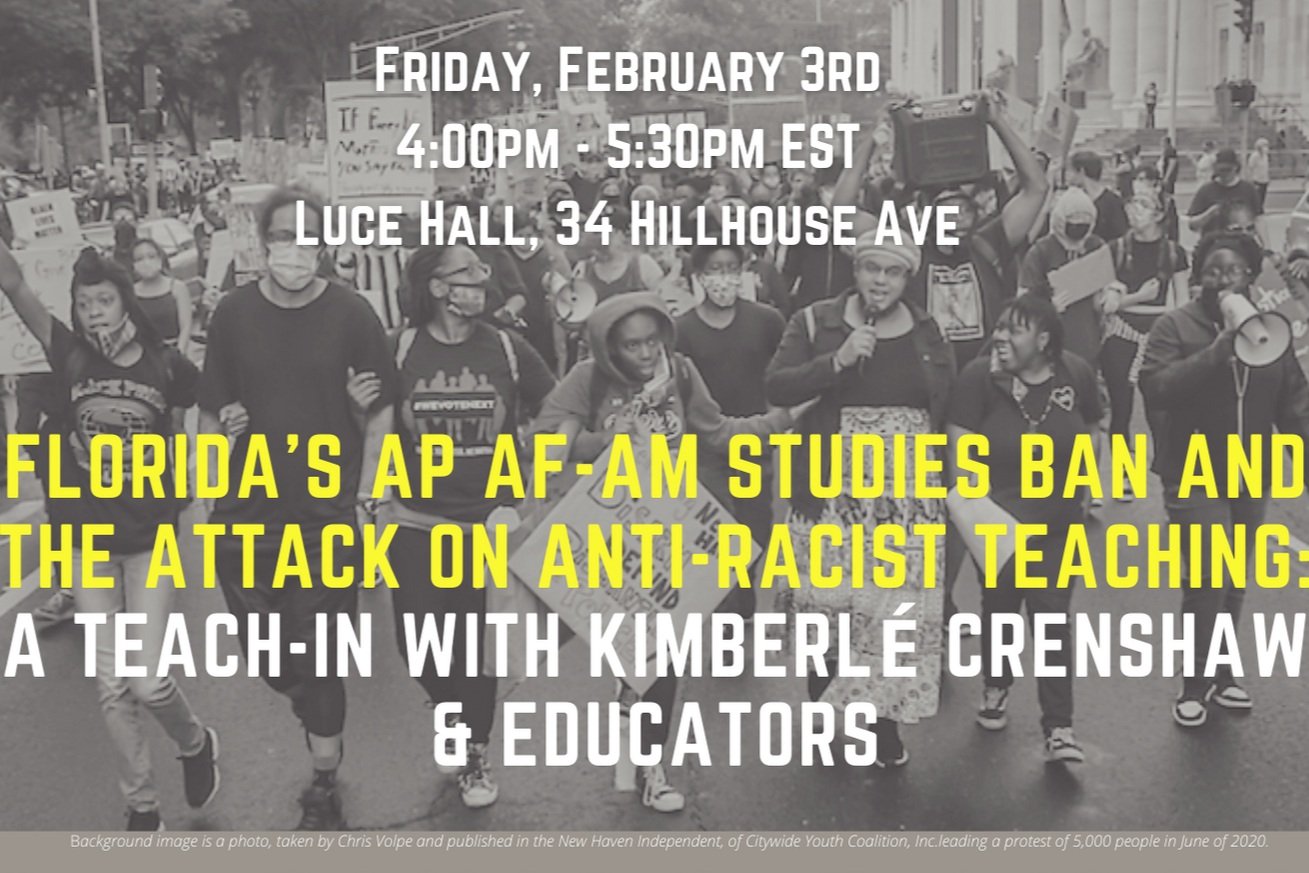
Florida’s AP African American Studies Ban and the National Attack on Anti-Racist Teaching: A Teach-In with Kimberlé Crenshaw & Educators
This month, Governor Ron DeSantis declared that the new AP African American History course could not be taught to Florida students if it included any content related to intersectionality, queerness, or social and economic justice, singling out scholars including Kimberlé Crenshaw, Rod Ferguson, bell hooks, and others.
Join Professors Crenshaw, Ferguson, the ARTLC’s Daisha Brahbam, and other anti-racist educators in a teach-in about the role of anti-racist education and Critical Race Theory in building a just and democratic future where everyone can flourish.
This teach-in is co-sponsored by the Anti-Racist Teaching and Learning Collective, The African American Policy Forum, Yale Faculty Senate, Yale Education Studies, and The Department of African-American Studies at Yale.
It will take place this Friday, February 3, from 4:00-5:30pm in the Luce Hall Auditorium at 34 Hillhouse Avenue (north of Trumbull Street, follow path west from street to enter building). Reception to follow. At that reception, Kimberlé Crenshaw and colleagues at the African American Policy Forum will have a signed book giveaway and share opportunities to get involved in ongoing campaigns.
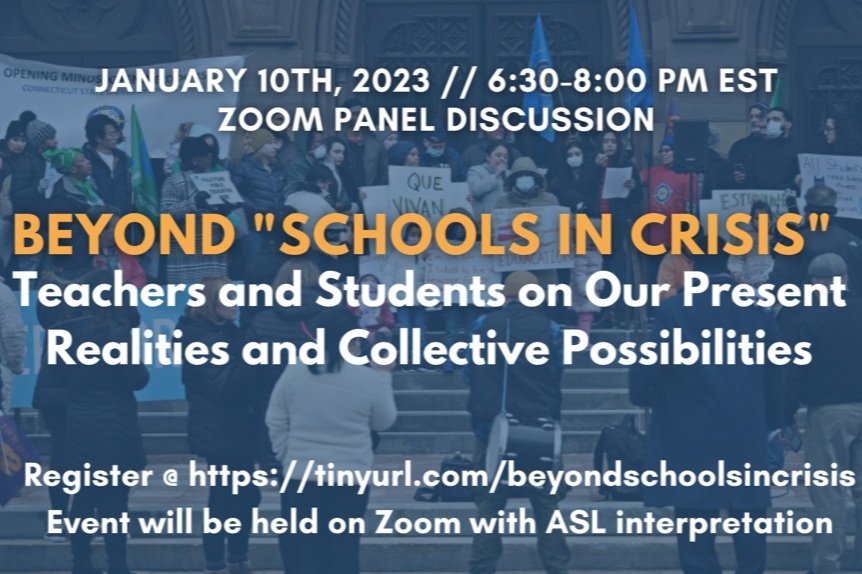
Virtual Event: Beyond “Schools in Crisis”
Every day, we hear about the great teacher resignation and shortage, student learning loss, and the many crises facing our schools. Missing from these debates have been the voices of the educators and students within our schools who share a far more nuanced understanding of what is taking place within them. Students and educators understand the problems schools face, and the long-standing conditions that the pandemic built upon and compounded. Their creativity, ideas, and insights are crucial to building a just future for all public schools.
This panel centers the voices of educators and students as we consider: What are the contours of the crises in our schools? How did these conditions precede the pandemic and which aspects are unique to this era? What power can we harness to transform our schools into the ones our students and educators have long deserved?
Advance registration required. Register here. Event will be held on Zoom with ASL interpretation
Sponsored by the Anti-Racist Teaching & Learning Collective, New Haven Federation of Teachers and Recovery for All CT and featuring:
Leslie Blatteau, New Haven Teachers Union President
Izzi Geller, New Haven Public Schools Teacher
Elsa Holahan, New Haven Public Schools Student
Alicia Strong, CT Teacher Resident, New Britain Public Schools
Dr. Erica Watson, Longtime CT Science Educator
Tenzin Youdon, New Haven Public Schools Student
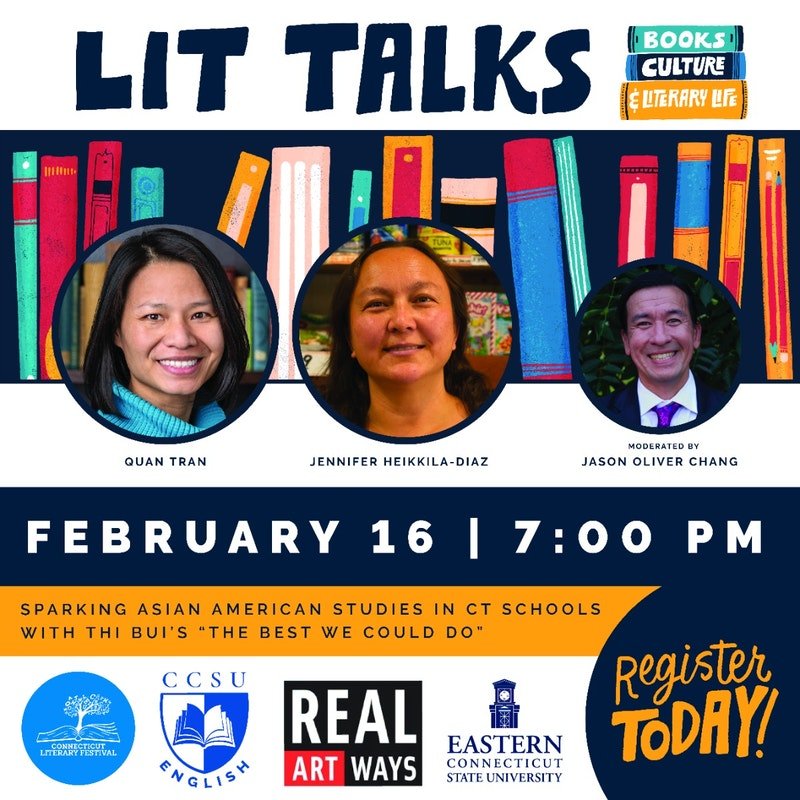
Sparking Asian American Studies in Connecticut Schools with Thi Bui’s “The Best We Could Do”
Sparking Asian American Studies in Connecticut Schools with Thi Bui’s “The Best We Could Do” is part of ECSU’ 21 NEA Big Read award (00029961) to celebrate Thi Bui’s graphic memoir.
NEA Big Read is a program of the National Endowment for the Arts in partnership with Arts Midwest.
El proyecto NEA Big Read es una iniciativa del National Endowment for the Arts (el Fondo Nacional para las Artes de Estados Unidos) en cooperación con Arts Midwest.
Jason Oliver Chang is Associate Professor of History and Asian American Studies at the University of Connecticut where he also serves as Director of the Asian and Asian American Studies Institute. As a public servant he sits on the Board of Education for West Hartford Public Schools, the Governor’s Hate Crimes Advisory Council, and the State Historical Records and Archives Review Board. He is the founding member of Make Us Visible CT a grassroots organization which led the charge for the introduction of Asian American and Pacific Islander studies in Connecticut public schools.
Jennifer Heikkila-Diaz (she/her or they/them) identifies as Korean American, Asian American, and biracial. For over two decades, she/they has worked in coalition with students, families, and school-based staff, pursuing educational equity–most of those years as a teacher, in school administration, and instructional coaching, and some of those years in education nonprofit work. She/they has had the privilege of supporting and partnering with thousands of students, families, teachers, and school leaders. Currently, JHD works at New Haven Promise as the Chief of Talent & Operations and at Fund for Teachers CT as a Program Officer. She/they is part of the CT Anti-Racist Teaching & Learning Collective, and is the co-founder of aapiNHV. She/they spends as much time as possible with young people, including her/their children, Magdalena and Gabriela
Quan Tue Tran is Senior Lecturer and Senior Program Coordinator in the Ethnicity, Race, and Migration Program at Yale University. She earned her PhD in American Studies from Yale University. Her research and teaching interests include critical refugee studies; Vietnamese boat people; Asian American studies; comparative ethnic studies; migration studies; diaspora and transnational studies; memory studies; and food studies. Her book manuscript, Anchoring Vietnamese Boat People’s History and Memory, examines refugee identity, community, and cultural formations in the global Vietnamese diaspora by tracing contemporary efforts in remembering the Vietnamese boat people exodus in Southeast Asia, Western Europe, Australia, North America, and cyberspace. Dr. Tran is also a poet and translator.
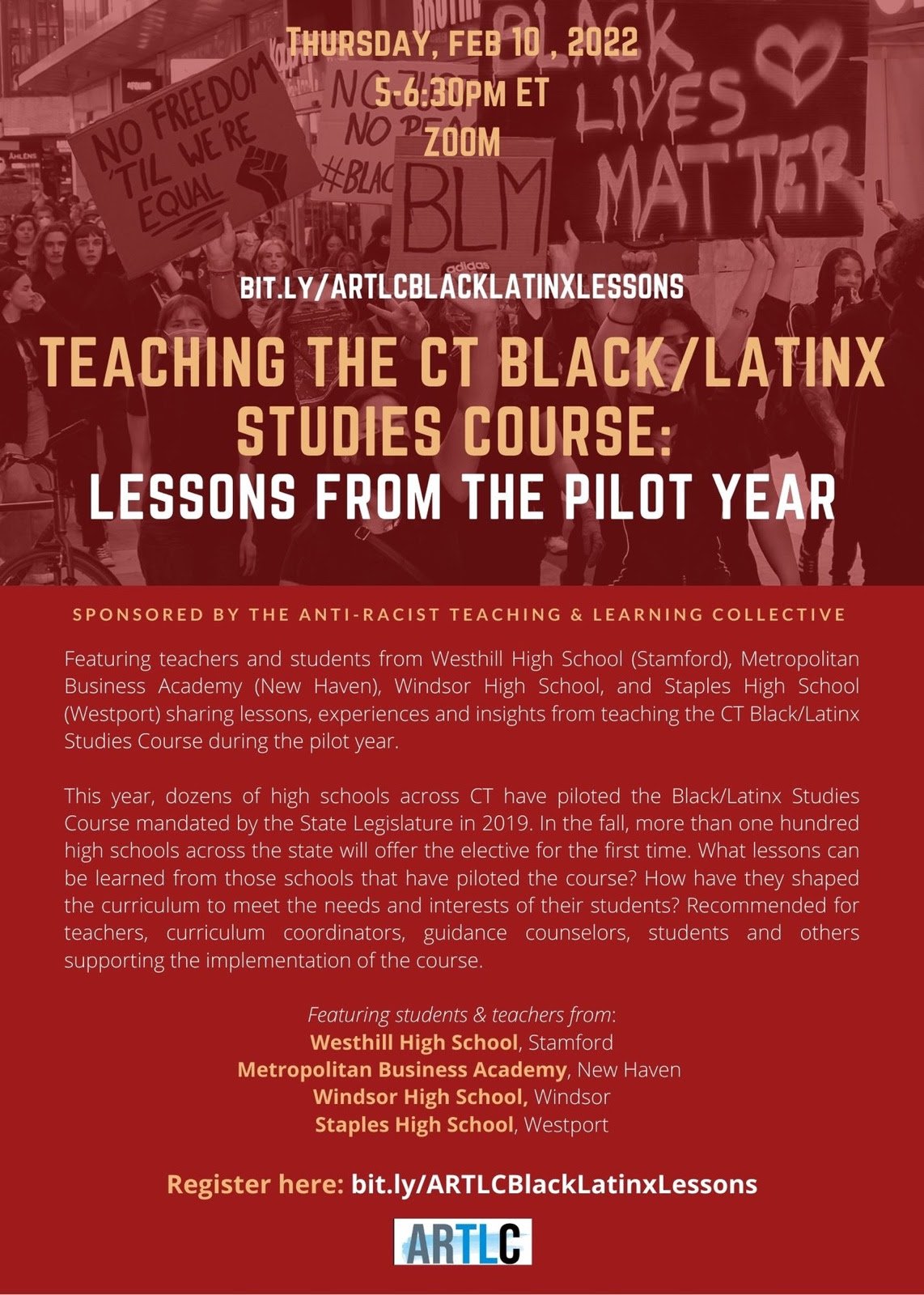
Teaching the CT Black/Latinx Studies Course: Lessons from the Pilot Year
Featuring teachers and students from Westhill High School (Stamford), Metropolitan Business Academy (New Haven), Windsor High School, and Staples High School (Westport) sharing lessons, experiences and insights from teaching the CT Black/Latinx Studies Course during the pilot year.
This year, dozens of high schools across CT have piloted the Black/Latinx Studies Course mandated by the State Legislature in 2019. In the fall, more than one hundred high schools across the state will offer the elective for the first time. What lessons can be learned from those schools that have piloted the course? How have they shaped the curriculum to meet the needs and interests of their students? Recommended for teachers, curriculum coordinators, department heads, guidance counselors, students and others supporting the implementation of the course.
Register here to receive Zoom link.

The Attack on Anti-Racist Education in CT: What Educators, Parents, and Leaders Need to Know
Monday August 9, 4:30pm via Zoom. Sponsored by the Anti-Racist Teaching & Learning Collective. Advanced registration is required here.
Connecticut has a diverse group of educators, schools, and youth-led groups committed to teaching about race and racism in ways that are accurate, complex and centered on the experiences and interests of students. Why then have these approaches come under attack? What forces are behind these campaigns, and what is their agenda for public education? And as we return to school this fall, how can we ensure that educators, parents and administrators are not silenced and punished for their efforts to meet the needs of their students?
This panel centers the voices of teachers, students, parents, and education leaders in exploring these questions. We especially invite school leaders, including district leaders, principals, assistant principals, deans, instructional coaches, and others to learn about the important role they must play in safeguarding the rights of parents, students and teachers.
Panelists include Meredith Gavrin, co-founder of New Haven Academy; Daisha Brabham, History & Civics Teacher at Norwalk Public Schools; Andrea Walker, of Hearing Youth Voices; Jorgieliz Casanova, a New Haven Public Schools graduate and parent and Program Manager at New Haven Promise, Kristin Mendoza, an ESL and English Teacher at Wilbur Cross High School (New Haven); and Tenzin Dhondup, a student activist from Naugatuck Equity Alliance and Naugatuck High School. Co-moderated by Rashanda McCollum, Executive Director of Students for Educational Justice and Daniel Martinez HoSang, Yale University.
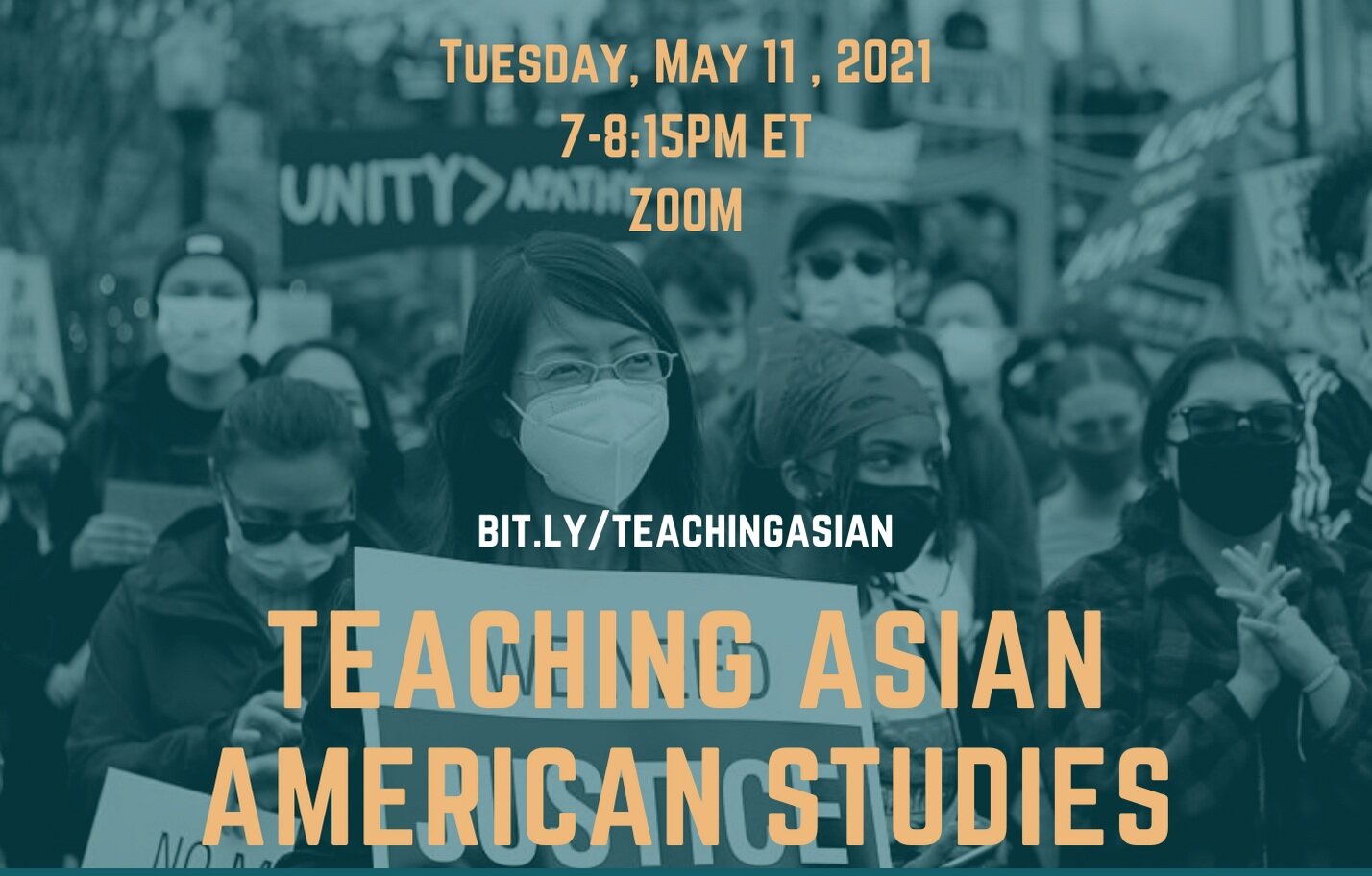
Teaching Asian American Studies
Asian American Studies is a dynamic and wide-ranging field that has been taught for more than 50 years in university and K-12 classrooms across the country. The recent rise in violent and racist attacks against Asian Americans makes the need to bring this work, and other fields in ethnic studies, all the more urgent.
This webinar gathers scholars, teachers, and students to introduce the contours of Asian American studies, classroom examples of how it's taught, youth voices about the need for Asian American studies, and a guide to curricular resources. This panel is part of a series which offers K-12 educators, students, community-members and scholars “bite-sized" introductions to the central principles, practices, and pedagogies around the broad themes of race and resistance. The webinar is sponsored by Anti-Racist Teaching & Learning Collective (ARTLC), Connecticut Council for the Social Studies, UCONN Asian and Asian American Studies Institute, Yale University's Education Studies Program, Yale's Center for the Study of Race, Indigeneity, and Transnational Migration (RITM), and Public Humanities at Yale.
Featuring:
Lisa Lowe, Yale University
Jason Oliver Chang, University of Connecticut
Katie Yue-Sum Li, teacher at Charlestown HS, Boston Public Schools
Joyce Fang, student at Farmington HS
Jaime Kim, student at East Lyme HS
Allison Norrie, teacher at Warde HS, Fairfield

Teaching Indigenous Studies: a Critical Introduction & Conversation for CT K-12 Teachers
Indigenous Studies is a rich and diverse field that is being taught in K-12 classrooms and through tribal education institutions across the country. In this session and critical conversation, a panel of experienced indigenous teachers, scholars, community educators, and youth leaders from across Connecticut will introduce critical concepts, resources, and teaching and learning frameworks applicable to educators and students at all levels, emphasizing the importance of expanding Native Studies in every grade level and subject area. A resource guide will be made available to all participants.
Featuring
Sandy Grande (Quechua), Professor of Political Science & Native Studies, UConn
endawnis Spears (Diné/ Ojibwe/ Chickasaw/ Choctaw), The Akomawt Educational Initiative
Beth Regan, Long-time teacher at Tolland HS & Vice Chairwoman and Justice, Mohegan Tribal Council of Elders
Shaquanna Sebastian, Youth Council Advisor, Mashantucket Pequot Tribal Nation
Phyllip Thomas, Youth Council Chairman, Mashantucket Pequot Tribal Nation
The panel is part of a series “Teaching About Race & Resistance: Critical Introductions for K-12 Teachers” that offers K-12 educators, students, community-members and scholars “bite-sized” introductions to the foundational principles, practices, and pedagogies around the broad themes of race, anti-colonialism, and resistance. The series is sponsored by the Anti-Racist Teaching & Learning Collective, Yale Education Studies, the Yale Center for the Study of Race, Indigeneity, and Transnational Migration, & Public Humanities. Please share widely with other educators, school staff, and advocates.
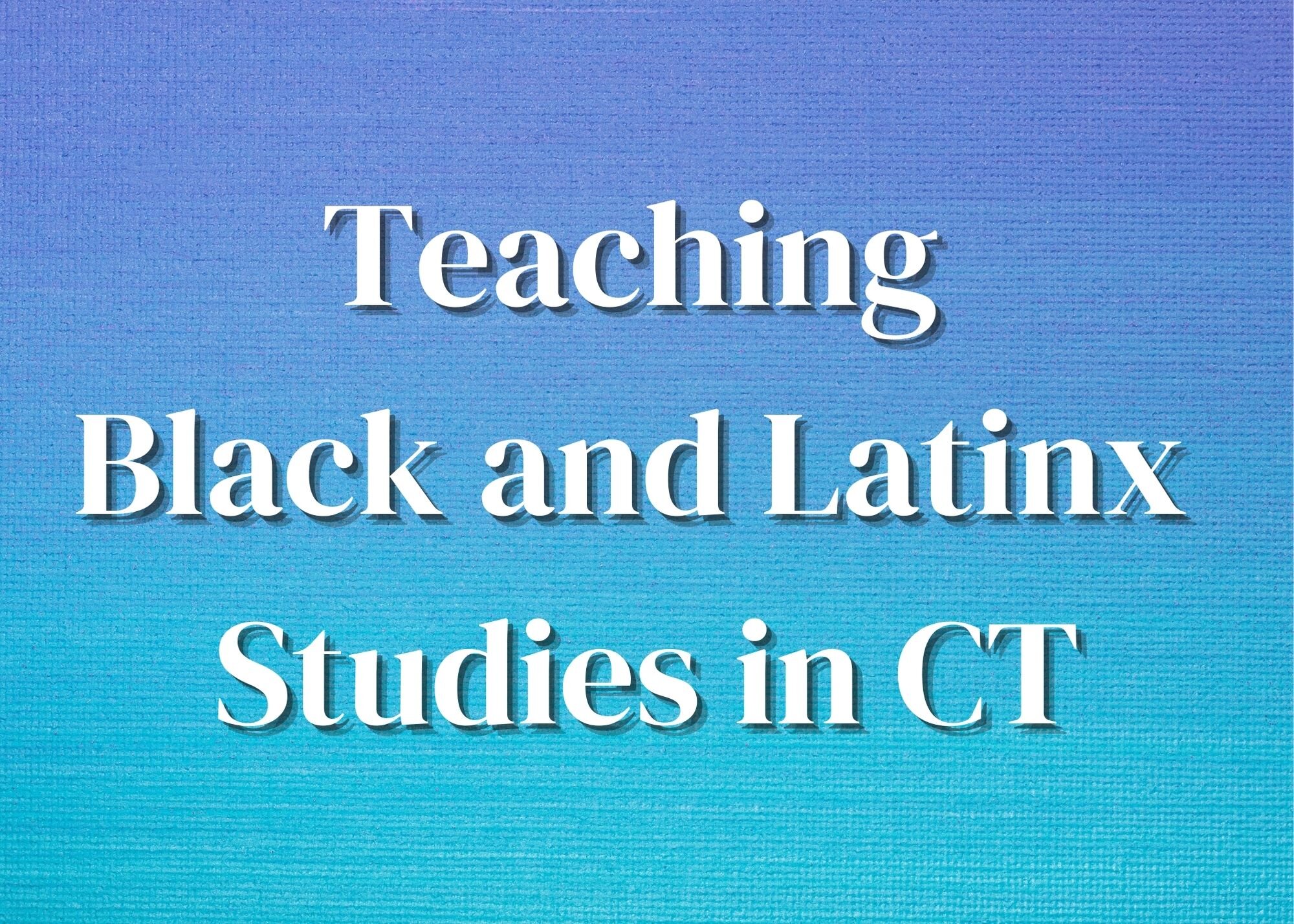
Teaching Black and Latinx Studies in Connecticut
This webinar will share and discuss a model Black and Latinx Studies curriculum developed by New Haven educator Dr. Kelly K. Hope. Dr. Hope has successfully taught the curriculum through an innovative collaboration with the Ungroup Society, a multi-issue community empowerment organization.
Dr. Kelly K. Hope, Educator
Dr. Kelly K. Hope is an educator and trainer who founded Kelly Koren Unlimited, a leadership and education consulting group. She has created an AfAm/Latinx curriculum which will be made available to webinar participants.
Warren Leach, The Ungroup Society
We will hear from Warren Leach of the Ungroup Society, a grassroots organization tackling issues in the community. This includes a Youth Social Justice Initiative that seeks to educate students in AfAm/Latinx studies.
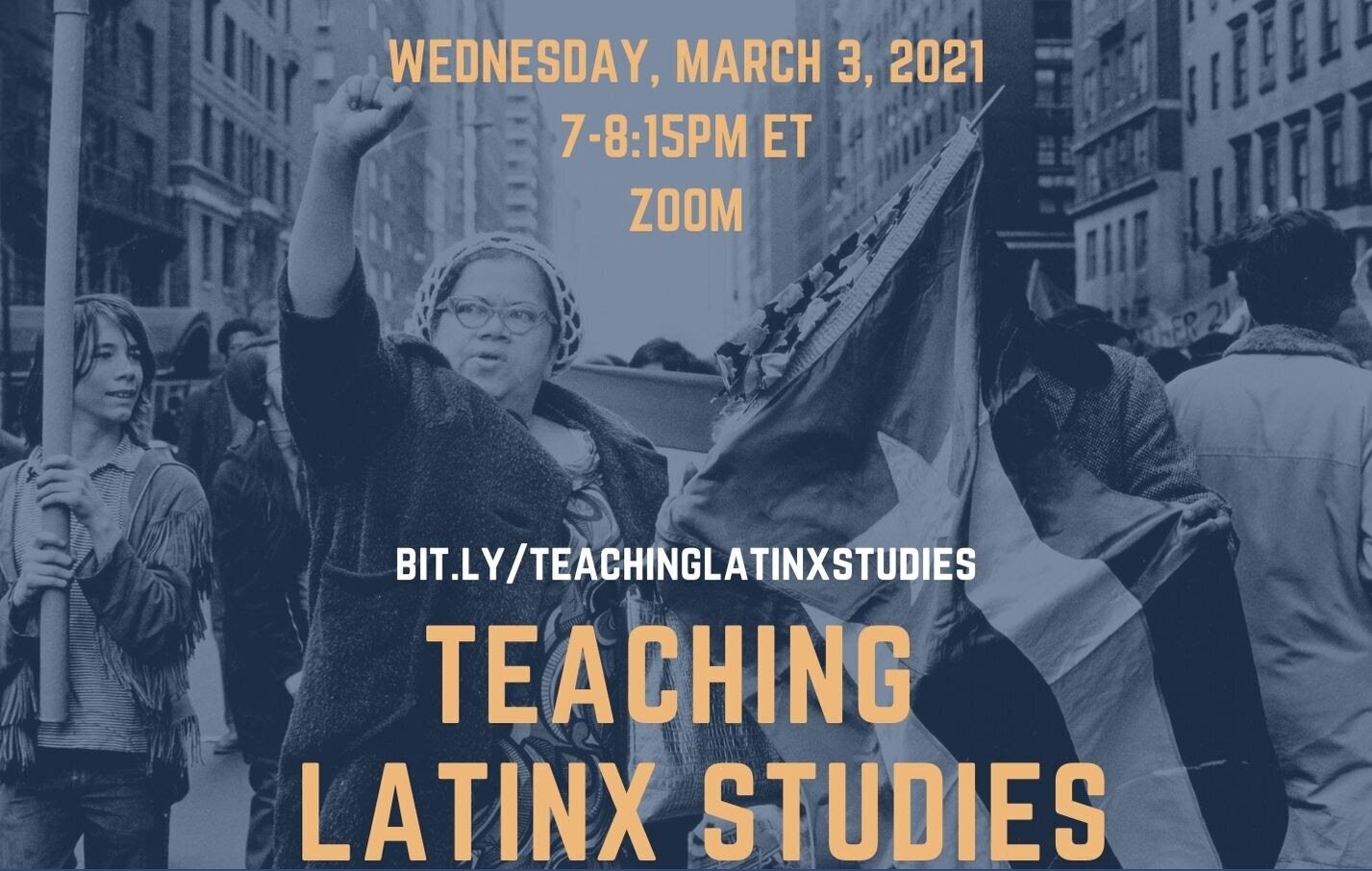
Teaching Latinx Studies: A Critical Introduction & Conversation for CT K-12 Teachers
An intergenerational panel of teachers, students, scholars and teacher educators will share curriculum and pedagogy examples, principles and practices for a range of subjects and grade levels, including those who will teach the new statewide African American/Latinx Studies course. We will also share a curated resource guide in progress with sample lesson plans, curriculum units, and primary sources for K-12 educators and students. The panel and resource guide emphasize a broad anti-racist framework in teaching Latinx Studies, one that centers Afro-Latinx themes, student experiences, and community-based collaborations.
Register in advance for this meeting here. After registering, you will receive a confirmation email containing information about joining the meeting. FB link is here.
Workshop: Developing Anti-Racist Place Based Curriculum For Your Class
A two-part workshop via Zoom for K-12 public school teachers in CT led by Nataliya Braginsky, Social Studies and English Teacher at Metropolitan Business Academy (High School), New Haven, via Zoom. Limited enrollment; $100 honorarium for participating teachers.
Monday, August 10, 1-3pm
Friday, August 14, 1-3 pm
Apply here: applications will be accepted on a rolling basis and applicants will be notified by August 6.
DESCRIPTION:
This two-part workshop is designed for K-12 teachers in CT public schools, especially in Social Studies and English/Literature, who are interested in integrating local histories of place, community, social movements, and culture into their curricula and pedagogy. In the first workshop on Monday (8/11), educators will gain a deeper understanding of what place based learning is and the power that it holds. The facilitator will share several examples of place based learning — namely a student-developed map of Black, Indigenous, and Latinx New Haven history and radical audio walking tours of two New Haven neighborhoods, narrated by students — offering specific information and instruction about creation and implementation. The Monday workshop will also focus on how to facilitate place based learning while teaching remotely.
In the three days following the workshop, participants will be asked to develop an outline for a curricular unit, a specific lesson (or two), a place-based project, or a new pedagogical practice that can be incorporated into their teaching, and will present them to the group on Friday for feedback and revision. In this way, the two workshops will support teachers in building upon the place based learning they may already be utilizing in their classrooms, as well as developing new anti-racist projects and pedagogical practices.
WHY PLACE-BASED PEDAGOGY? The land on which our schools sit and the cities we call home hold deep histories, which both predate the formation of the United States and lay its foundation. Supporting students in unearthing these histories can be a powerful step in the direction of liberatory education as it reveals vital truths about this country, which are too often left out of the curricula: that white supremacy has been embedded in all U.S. institutions since this country's inception, and that Indigenous, Black American, Asian American, and Latinx people have not only resisted that white supremacy, they have played a critical role in building and transforming the nation.
ABOUT NATALIYA BRAGINSKY
Nataliya Braginsky is a high school social studies teacher who has been working in schools since 2007. For the past seven years, Nataliya has worked at Metropolitan in New Haven, where she teaches African American and Latinx History, Journalism, and Contemporary Law, in addition to co-advising the Gender & Sexuality Alliance (GSA) and Youth Justice Panel.
What's Happening with Ethnic Studies in CA?
An analysis of the CA Dept of Education revisions to the Ethnic Studies Model Curriculum from the perspectives of founders, experts, and writers. Join them Friday, August 7th at 5:30pm for a webinar on what's been happening with Ethnic Studies in CA. Moderated by AROC: Arab Resource & Organizing Center and hosted by the Save Arab American Studies Coalition
Speakers:
-Aimee Riechel - SFUSD Curriculum & Instruction specialist
-Nesbit Crutchfield - Director of the Bay Area Venceramos Brigade, Veteran of the 1968 Black Student Union Student Strike
-Theresa Montaño - Professor, CSUN Chicana/o Studies, CFA caucus chair
-Allyson Tintiangco-Cubales, Ph.D. - Professor of Asian American Studies/College of Ethnic Studies
-Samia Shoman - Manager of English Learner & Compliance Programs at San Mateo School District.
RSVP: https://tinyurl.com/y3zc8fny
Visit their website http://www.savearabamericanstudies.org
Witness Stones & Hard History Webinar
The Connecticut Association of Independent Schools (CAIS) and Witness Stones Project are hosting a two-day CAIS Online Workshop on Slavery in Connecticut and the North, joined by Dr. Hasan Kwame Jeffries, Rep. Patricia Wilson Pheanious, and Dennis Culliton.
Reflecting on what it means to be American in 2020 is uncomfortable and educators need guidance to help students sustain dialogues involving race and slavery. While it is difficult, it is also necessary to truly understand our history.
Everything we are saying about the past affects how we are acting in the present moment. Our current national turbulence, with all of its anguish and rage, demonstrates the difficulty inherent to coming to grips with our history. Workshop participants will leave these sessions with a framework, content, and language to bring this work to their curriculum in order to help students confront the cumulative dark legacies of slavery and racism in our history, and discover how this systemic racism shapes society today. Ultimately, this workshop will help participants find the people who have built your community, share their untold stories and commemorate their lives.
On August 3rd, Rep. Patricia Wilson Pheanious and Dennis Culliton of The Witness Stones Project will provide both a template for historical research and a lens through which we can view the history and the lives of enslaved individuals. With our country currently locked in a tumultuous reckoning to define what it means to be an American in 2020, the dialogue that is occurring is futile unless we know who we are. As Americans take down statues, the Witness Stones Project offers teachers and students a framework for installing memorials in honor of enslaved individuals.
On August 4th, Dr. Hasan Kwame Jeffries will share his expertise and help us begin the work of learning how to help students sustain dialogues involving race and slavery. Dr. Jeffries specializes in African American history and is an associate professor of history at Ohio State University. He is also the chair of the Teaching Hard History Advisory Board and a host of the podcast Teaching Hard History: American Slavery.
Register at: caisct.org/cthardhistory
Registration fee: $35 per person
The Anti-Racist Education We Need: Lessons from CT Students & Teachers
In this webinar, we’ll hear from two panels on specific examples of anti-racist teaching, learning, and collaboration underway in schools across the state. Our panel of student organizers from the Students for Educational Justice and CT Students for a Dream will describe their efforts to implement holistic educational reform. Our second panel consists of public high school teachers with a long history of anti-racist teaching who will share examples of curriculum and pedagogy that they have employed in the classroom, as well as the frameworks and strategies that define an anti-racist educator. Click here to read more & register to attend!
